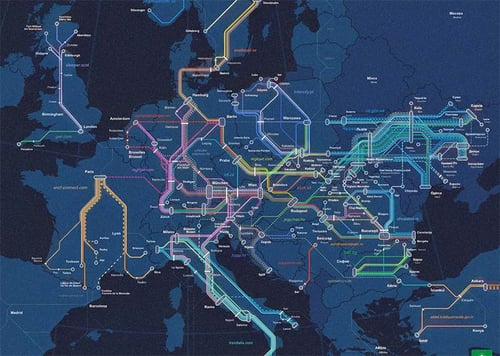
Sleep the European plane dominance away
Fall asleep in Belgium and wake up in Venice. That will soon be one of many new night train options for European travellers. The number of overnight train routes in Europe decreased heavily after the 1990s, but night trains are gaining popularity again – and new offers continue to be introduced.
With the consequences of the climate crisis becoming more apparent every year, many travellers are rethinking their travel habits. More than two-thirds of Europeans prefer train travel over flying. Given that Europe already has a well-connected international rail network, it seems a waste not to use it through the night, but air travel continues to hold European consumers back.
The state of night train travel in Europe
While Europe's night train network has grown significantly since 2021, the number of night services offered varies dramatically between countries and regions.
In the UK, many larger cities are connected to London by the Caledonian Sleeper trains, and in Sweden, Snälltåget and SJ Nattåg connect many major cities to Stockholm. Italy has IntercityNotte, France has SCNF Connect, and ÖBB NightJet connects much of central Europe.
But in some places, there's not much. In Spain, for example, there are no existing domestic night trains and only a few small lines connecting the country to Portugal or France.
A number of private railway companies have stepped up efforts to bring night train connections back. European Sleeper, for example, a Belgian-Dutch company founded in 2021, focuses solely on international overnight routes. European Sleeper started with a route connecting Brussels to Amsterdam and Berlin, and extended the line to Dresden and Prague earlier this year. From February 2025, the company will begin service from Brussels to Venice via Cologne, Munich and Innsbruck.
Meanwhile, some existing domestic transport companies are also looking to expand outward. In 2021, Sweden's Snälltåget extended a route from Stockholm to Copenhagen all the way down to Berlin. Czech-based RegioJet has also expanded outward, connecting to Slovakia and western Ukraine.
A challenging task
Among the challenges confronting night train operators are high operating costs and gaining access to state-owned rail networks. The European Commission has tried to help with the latter issue, pushing for ”open access” to national rail networks in Europe.
But even when rail networks are technically available to private companies, legacy operators are far better positioned to bid on and secure usage rights that suit their timetables. And access fees are only growing. In Germany, it was announced this month that ”track access prices” will increase by about 20% by 2026 to help fund infrastructure upgrades in the country.
Assuming train companies navigate those challenges, they then need to overcome the mountains of paperwork (and further costs) that come with clearing bureaucratic regulations that differ from country to country. The biggest hurdle to night train travel in Europe is not the cost for the train operators but the money their competitors receive.
Your flight shouldn't cost 10 euros
Flying continues to be cheaper than taking the train over long distances. That's a consequence of how much money the EU invests into the aviation sector despite aiming to reach net-zero emissions by 2050. The aviation industry received €37 billion in subsidies from the EU following the pandemic.
And those are just the direct subsidies, e.g. money that the industry receives at EU, national, and local levels. Indirect EU subsidies to the aviation industry, such as tax exemptions, amount to €26.4 billion, each year.
To put these numbers into perspective, if there were higher taxes on the aviation industry in the EU, governments could invest in building an entirely new high-speed railway network from Hamburg to Rome.
What can we expect?
Despite these hurdles, the clear and growing demand for more and better rail travel in Europe will likely continue to push transport companies to find ways to bring more overnight connections to the continent.
Yet, while new routes are already in the works, night train travel can only be a serious competitor to the aviation industry if the playing field is even. It's difficult for any sustainable alternative to compete with the heavy investments in the aviation sector.
Expensive ticket prices are partially offset by the money saved on a night's stay in a hotel, but more subsidies into sustainable travel options, and less into the aviation sector are needed to make night train travel a viable option for all Europeans.
If done, the dream of European teleportation (or at least falling asleep in one city and waking in another) isn't so far out of reach after all.